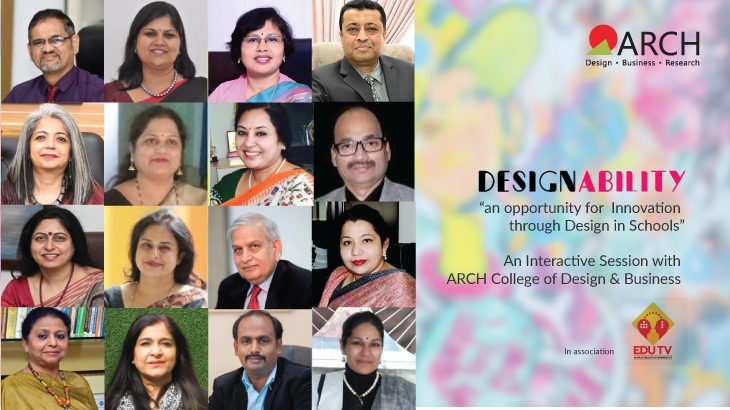ARCH College of Design and Business organized an online conference of notable educational reformers and leaders from different parts of the country and a few from abroad as well. The mood thus set in this DesignAbility symposium was rather upbeat and vibrant. Armed with the knowledge of the interconnectedness of all the different aspects of sciences and arts, the leaders discussed how design ability can create a plethora of opportunities for innovation in the existing educational system and train their students to be prepared for an innovative approach in their future endeavours.
The Founder & Director of ARCH College, Ms. Archana Surana imputes great emphasis on breaking the norms and thinking out of the box in order to create on one’s own rather than aping the west. Throwing light on the importance of unlearning the prevailing methods, she suggests a more holistic and multidisciplinary approach to the educational trends by citing a few examples.
Dr Suchitra Bhatt applauds the New Education Policy {NEP 2020} which promotes more value-based education as compared to the current education system and the entire panel agrees that liberal education is the future. Professor Pramod Sharma, Vice-President of Genesis Global School concurs that research and creativity were less explored subjects prior to NEP and considers it to be the need of the hour. NEP has opened a new sphere of innovation and research into our society as it favors teaching in a more vernacular fashion, rather than mugging up the books!
Principal of DAV school, Ms Anu Arora quotes “2020 was the year of Design Thinking”, and questions orthodox teaching by using the example of implementing changes in her own school. Similarly, Dr Priyanka takes pride in how the school adds value to the entire community, setting up solar panels and afforesting the vicinity. Schools must prepare children for the real world out there, making learning very visible.
Professor Bhargav Mistry, notable NID aluminous and Dean of Design Culture at ARCH elucidates how design thinking is not a magic mantra to be practiced in isolation, but a clever and creative amalgamation of scientific, technological and socio-economic thinking, combined. Technological and scientific explosions of the 21st century is one reason intellectuals need to connect all arts and technology in a creative, human centric way to address the various challenges we all face in these times.
Dr Pooja Bose criticizes how the majority of our nation believes in taking less risks as the appetite to take risks will lead to innovation. The panel discusses how to make the best use of the available resources to create a more desirable future and letting the school children do whatever they wish to instead of a curriculum-based learning. Dr Manju Gupta of Kothari International School, Noida sets an epitome by not having books at all till middle school, encouraging design thinking.
Summarizing the event by quoting Socrates, Dr Kajal says education is kindling of a flame rather than filling a vessel. The panel, consisting majority of women leaders, already breaking the norms of predominantly patriarchal society concludes on how design is being integrated into the very being of mankind.
The symposium was a success, encouraging teamwork and collaboration for effective problem solving by focussing on a human centric approach and finished on a high note by raising awareness on how design thinking is bridging the gap between science and arts and humanities as well. In transition to an innovation-based time in history, the creative and cultural industries have skyrocketed in the contemporary world i.e., a world made better by technology. As it is becoming increasingly interconnected and complex, there is a need to generate ground-breaking solutions to the most wicked, complex problems. The conference ended on a high note after a brief informative video clip about ARCH College of Design and Business.
